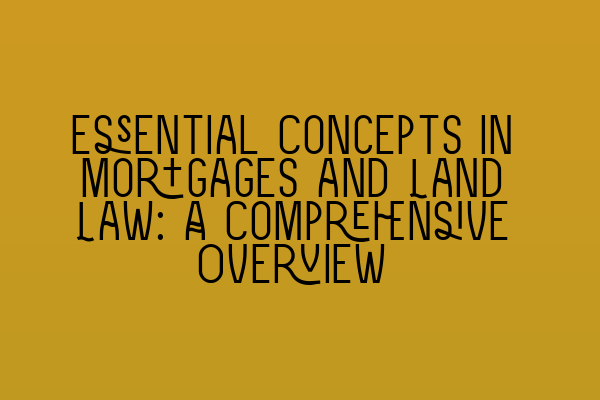Essential Concepts in Mortgages and Land Law: A Comprehensive Overview
Welcome to SQE Property Law & Land Law, where we provide expert guidance and support in all matters related to property law. In this article, we will walk you through the essential concepts in mortgages and land law, to help you gain a comprehensive understanding of this intricate area of law.
1. Introduction to Mortgages
Mortgages play a vital role in property transactions, allowing individuals and businesses to secure loans against their properties. Understanding the key principles of mortgages is crucial for anyone involved in property law. A mortgage is a legal agreement between a borrower (the mortgagor) and a lender (the mortgagee), granting the lender a security interest in the property as collateral for the loan.
Key terms related to mortgages:
- Pledge: A pledge is a form of security interest where the borrower physically delivers the property to the lender as collateral.
- Mortgage Deed: The mortgage deed is a legal document that outlines the terms and conditions of the mortgage agreement.
- Equity of Redemption: The borrower’s right to redeem the property by repaying the loan in full.
- Foreclosure: If the borrower fails to repay the loan, the lender may initiate a foreclosure process to take possession of the property and sell it to recover the outstanding debt.
To dive deeper into the topic of mortgages, you can check out our article on SRA SQE Exam Dates.
2. Types of Mortgages
Mortgages come in various forms, each with its own set of characteristics. Here are some common types of mortgages:
- Fixed-Rate Mortgage: With a fixed-rate mortgage, the interest rate remains unchanged throughout the loan term, providing borrowers with stability and predictable monthly payments.
- Variable-Rate Mortgage: In a variable-rate mortgage, the interest rate fluctuates with market conditions, which can lead to changes in monthly payments.
- Interest-Only Mortgage: An interest-only mortgage allows borrowers to make only interest payments for a specified period, often followed by principal and interest payments.
- Reverse Mortgage: Reverse mortgages are designed for older individuals and allow homeowners to convert a portion of their home equity into cash without selling the property.
To gain a deeper understanding of the different types of mortgages, visit our article on SQE 1 Preparation Courses.
3. Land Law and Mortgages
In land law, mortgages are closely intertwined with the legal principles governing land ownership and transfer. Understanding the relationships between mortgages and land law is essential for property law professionals. Here are some key concepts:
- Legal vs. Equitable Mortgages: In legal mortgages, legal title is transferred to the lender until the loan is fully repaid. Equitable mortgages, on the other hand, involve the transfer of an equitable interest in the property.
- Priority: When multiple mortgages exist on a property, determining priority is crucial in determining the order in which the lenders can enforce their rights.
- Notice: The principle of notice ensures that lenders are aware of any competing interests or claims on the property. This includes actual notice, constructive notice, and imputed notice.
- Overreaching: Overreaching occurs when a mortgage is protected against claims by third parties, such as beneficiaries of a trust, by transferring the legal title to trustees, who act as gatekeepers.
To further explore the intricate relationship between land law and mortgages, we recommend our article on SQE 2 Preparation Courses.
4. Enforcement of Mortgages
Enforcement of mortgages involves the legal actions taken by lenders to recover the outstanding debt when borrowers default on their mortgage payments. Here are some key aspects:
- Power of Sale: The power of sale allows the lender to sell the property without court intervention in order to recover the outstanding debt.
- Foreclosure: Foreclosure is a court process that enables the lender to take possession of the property and sell it to recover the debt.
- Repossession: Repossession involves the lender taking physical possession of the property due to default by the borrower.
- Deficiency Judgment: In case the sale of the property does not cover the full debt, the lender may seek a deficiency judgment to recover the remaining amount.
If you’re interested in practicing your knowledge of mortgages, we recommend trying out our SQE 1 Practice Exam Questions and SQE 1 Practice Mocks FLK1 FLK2.
Conclusion
Mortgages and land law are intricate areas of property law that require a solid understanding to navigate successfully. From the essential concepts to the enforcement mechanisms, grasping the fundamental principles is vital for lawyers and individuals involved in property transactions.
We hope this comprehensive overview has provided you with valuable insights into mortgages and land law. For further guidance and support, don’t hesitate to reach out to us at SQE Property Law & Land Law.
